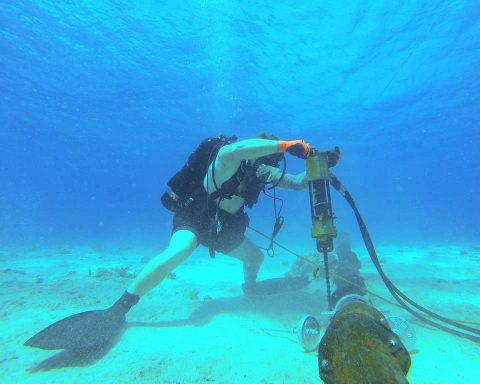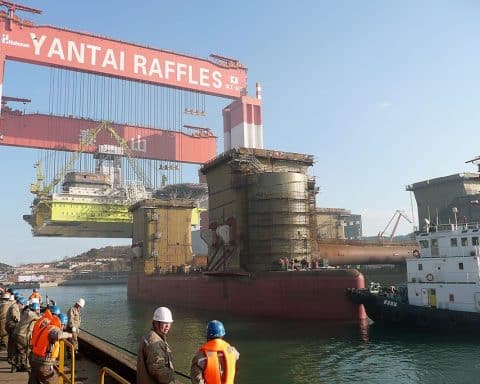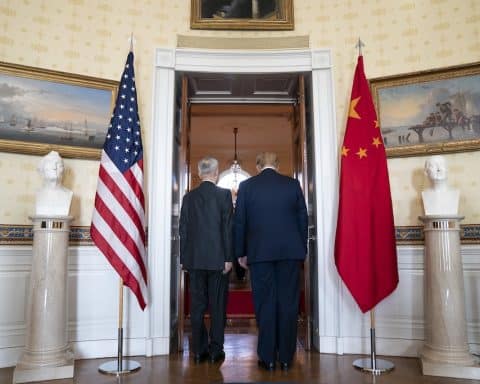Natten mot torsdag exploderade ett varulager med kemiska produkter i megastaden Tianjin, cirka 150 kilometer sydost om Peking.
Jag skrev närmare om detta samt postade en handfull videos här på InBeijing tidigare i veckan. Dödssiffran har i dag stigit till 85, samtidigt som den exakta orsaken till explosionen är fortfarande oklar.
Orsaken kan också komma att för all framtid bli oklar. Journalister som inte är från kinesisk statlig media hindras nämligen från att rapportera i området. Motivet torde vara att Kinas myndigheter själva vill ”bestämma” dödssiffran, samt att det inte ska läcka ut några känsliga uppgifter om det nu skulle vara så att slarv från tjänstemannahåll föranledde olyckan.
Denna procedur är praxis vid stora olyckor i Kina, noterar Los Angeles Times:
After such large-scale disasters, the Chinese authorities tend to follow a familiar pattern: They keep reporters away, delete criticism on social media sites and flood state-run media with praise for the government’s relief efforts. But it is becoming harder to suppress bad news.
In 2011, a high-speed train crash that killed 39 people near the eastern city of Wenzhou turned into a public relations debacle when official propaganda directives were leaked online. They urged journalists to refrain from investigative reporting and only do “stories that are extremely moving,” such as volunteers donating blood.
In June, when nearly 400 people were killed when a cruise ship capsized on the Yangtze river, authorities warned relatives of the deceased not to speak with foreign media.
“I can’t rule out that even among Chinese journalists there are people who want to smear the government,” the city of Nanjing’s deputy police chief, Hu Shining, told them, according to the Reuters news agency.
Även denna gång har kritik eller bilder tagits bort från kinesiska sociala medier, och ”nyhetsrapporteringen” kring explosionen har i inhemsk media främst handlat om vilka utmärkta insatser de politiska ledarna gör för att stödja räddningsarbetet.
Att det inte blir tal om någon självständig mediarapportering i Tianjin ses redan av att journalister från såväl USA som Europa och Taiwan. Foreign Correspondents’ Club of China ger några exempel:
3. A Taiwanese reporter said authorities confiscated his camera’s memory card and demanded that he kneel and beg for it back.
The journalist from Taiwan’s Eastern Multimedia Group came very close to the explosion site and started taking pictures at noon Thursday. Suddenly more than 10 policemen in uniform surrounded and questioned him, and tried to take him to the police station. Eventually this reporter was released after presenting his Taiwan ID. But a policeman removed the memory card of the reporter’s camera. The reporter demanded it back, to which the police replied “not unless you kneel down in front of me.” The reporter did not indicate he received the card back or receive an apology. The incident caused substantial anger among the Taiwanese press corps. (Ma Xiaoguang, the spokesman of China’s state council office for Taiwan affairs said in response that the policeman must have been “very stressed” at the time. He also commented that this policeman should not be taken as representative of all policemen or the mainland government and said he hoped the Taiwan press “will not respond to it radically.”)
I exemplet nedan visas också hur statliga kinesiska medier tillåts rapportera – men inte självständiga eller utländska reportrar – eftersom Kina vill kontrollera informationen:
4. A video journalist for a European media outlet was harassed outside a hospital.
From the journalist: Myself and our photographer went to shoot outside the hospital (I think it was the same one the CNN got roughed up at). As we approached, still outside, i pointed my camera towards triage tents, guys who dressed like soldiers but said they were doctors asked me nicely not to film them. As I turned my camera towards the building itself, an angry woman with a radio ran up to us and told us we cant shoot. We asked why, she said ’because this is China!’ we asked who she was, she said she was a Chinese. So we said as journalists we can shoot outside freely, before we could keep walking, a young cop came over. He said we cant film, no one can film. Meanwhile there are at least 4 local video crews interviewing people in plain sight a dozen meters away. Right in front of the entrance. One of the crews was from Hong Kong. but all looked Chinese. We asked the woman, she said foreigners can’t shoot here. We asked the cop, he said no one can shoot here.
The cop said he’d get the others to stop shooting, and made a lame attempt to get them to stop, then told us to point out who’s filming to him and he would stop them. Of course we didn’t. Once crew was interviewing people right next to us. We asked the cop why he let them shoot and he said they were filming ’for fun’.
The woman with the radio never identified herself. She was in civilian clothing. She kept saying this is China, go away. She radioed in to someone to explain there were foreigners trying to shoot. Another woman started screaming at onlookers to help her stop these foreigners from filming, because we dont know their motivation etc etc. At this point the.young cop tried to calm her down. We aren’t pressing forward and aren’t retreating. We are non confrontational and relaxed. Eventually, the young cop calls a senior cop, who turns up and says no one an shoot. He denies Chinese crews (who are less than 10m away) are shooting. He requests our passports and checks them but doesn’t radio colleagues or take photos. When we say he has seen we are legitimate and we know the law, which says we can shoot outside, he gets angry and starts shouting that if we don’t leave, he will take us to the police station to check our credentials. We say he just checked our credentials, and he gets more angry. Eventually a guy in civilian clothes pulled him away. They gave us an ultimatum — go to the hotel media center now or go to the police station. We decided to go away so as not to waste hours at the police station. Meanwhile, local crews continued to shoot outside and inside the building.
En video cirkulerar också på internet, där CNN:s reporter Will Riley blir överfallen av flera personer utanför ett sjukhus som beordrar honom att sluta filma och radera innehållet på kameran:
https://www.youtube.com/watch?v=THRTo-sadqo
Att nu även vanligt folk motsätter sig medias lagliga rätt att rapportera från olycksplatser är i alla fall delvis en konsekvens av Kinas historieförfalskning och tuffare retorik mot utlänningar sedan Xi Jinping tog makten för drygt två år sedan.
Det kan också antas att samma retorik spelade betydelse för det vansinnesdåd där en ung kines under torsdagen anföll en fransman och hans fru med svärd på öppen gata i ett av Pekings mest populära shoppingdistrikt.
Utvecklingen är oroande. Ju mer Kinas myndigheter försöker kontrollera media, desto mindre tror landets invånare på rapporterna där och vänder sig istället till sociala medier där ryktena flödar.
Samtidigt verkar den del av befolkningen som sväljer Xi Jinpings propaganda bli allt mer fientlig mot utlänningar och även inhemska journalister som inte rapporterar olycksfall som detta på ett ”positivt” vis.




